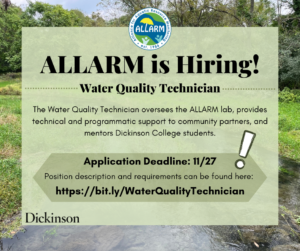The purpose of the Alliance for Aquatic Resource Monitoring’s Water Quality Technician is three-fold:
-
- Manage ALLARM’s laboratory (troubleshooting equipment and testing new techniques), run a statewide quality assurance/quality control lab (chemical, physical indicators), ensure compliance with our Quality Assurance Project Plan, and maintain ALLARM’s volunteer equipment loan program.
- Provide technical assistance to communities interested in stream monitoring and restoration assessment; this requires a strong background in aquatic and watershed sciences.
- Teach Dickinson College students to work in ALLARM’s laboratory, conduct stream monitoring, and effectively do science communication, data management, and data visualization.
Essential Functions:
- Coordinate ALLARM’s statewide quality assurance/quality control program for volunteer monitors, and ensure that lab practices are in accordance with our federally approved quality assurance project plans. While teaching students diverse methodology and laboratory principles.
- Oversee the laboratory operation – student workflow, troubleshooting equipment, lab safety, equipment/supplies inventory, supplies ordering, equipment maintenance, and data reporting. Track lab and technical assistance activities for grant reporting.
- Teach ALLARM students to conduct watershed science research and equipment comparability tests in ALLARM’s laboratory and in the field.
- Creatively explore new watershed science techniques to help develop enhanced community science resources.
- Provide technical and programmatic support to 5-7 community partners throughout the region. Connect with partners, assess their needs, and conduct biological, chemical, and visual monitoring workshops.
- Mentor students to conduct community-based workshops, provide follow up assistance to communities, and learn how to build partnerships.
- Participate in and represent ALLARM in regional partnerships/coalitions (e.g. Consortium for Scientific Assistance to Watershed and/or Chesapeake Monitoring Cooperative).
Education:
Required: Bachelor’s degree – Environmental Science/Biology/Ecology/Resource Management
Preferred: Master’s degree – Environmental Science/Biology/Ecology/Resource Management
**Experience may substitute for a master’s degree.
1-3 years work experience

